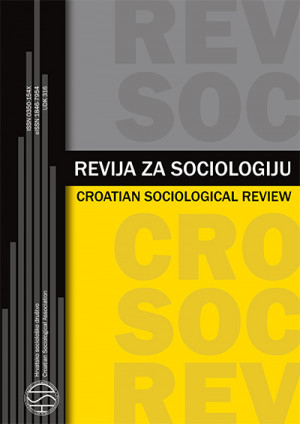Neformalna i formalna religijska socijalizacija u ranom djetinjstvu: veze i paradoksi
Informal and Formal Religious Socialisation in Early Childhood: Ties and Paradoxes
Author(s): Željko Boneta, Marina Šanko-Brletić, Željka IvkovićSubject(s): Education
Published by: Hrvatsko sociološko društvo
Keywords: religious socialisation; family religious environment; education-infaith programme in kindergartens; transmission of religiosity
Summary/Abstract: The article deals with the discrepancy between the widespread family religious environment in Croatian society and the modest enrolment of children in the education-in-faith programme (EIFP) in kindergartens. The classical theory of socialisation is applied since it is more suitable for explanation of the initiation of a child in a religious community than the theories of religious capital (Iannaccone) and religious preferences (Sherkat). A field survey was conducted on a sample of 257 parents of children who attend kindergartens in the area of the City of Rijeka. The sample included two groups of respondents: parents whose children attended regular programmes, and parents whose children attended EIFP. Differences between the two groups of parents were explored in: general indicators of religiosity; experience of religious socialisation in their childhood; religious socialisation of their children; the family religious environment; motives for enrolment and satisfaction with EIFP, or interest in enrolment; and, the acceptable way of institutionalisation of EIFP. A prevalence of indicators of general religiosity and religious socialisation in the family has been identified in both groups. Parents whose children are enrolled in EIFP are more religious by all indicators, and the key predictor of enrolment in the programme is regular attendance at religious services. Research found four paradoxes in the studied population. The first one is the contrast between prevailing indicators of religiosity and the relatively modest participation of children in EIFP. The second one is the contrast between prevailing religious socialisation of children in the family and the minority readiness of parents to enrol them in EIFP. The third and major paradox is the change in parental attitudes when enrolling children in the extracurricular subject of catechism in elementary school. The fourth one refers to (in) consistency in transmission of religious socialisation. The conclusion is that some parents are interested in formal religious socialisation for their children, but most of the respondents do not include EIFP in kindergartens in their idea of formal religious socialisation of their children.
Journal: Revija za sociologiju
- Issue Year: 43/2013
- Issue No: 1
- Page Range: 57-81
- Page Count: 25
- Language: Croatian

